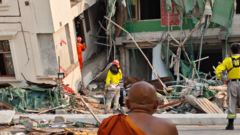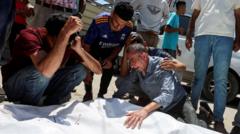As the death toll from the devastating earthquake in Myanmar surpasses 3,000, Secretary of State Marco Rubio downplayed criticism of the US government's response, highlighting the challenges posed by the local military regime and suggesting that other affluent nations should likewise contribute to relief efforts.
Rubio Stands Firm on US Response to Myanmar Quake Amid Criticism

Rubio Stands Firm on US Response to Myanmar Quake Amid Criticism
Secretary of State Marco Rubio addresses the backlash concerning the US response to the recent earthquake in Myanmar, attributing challenges to the military regime and emphasizing a shared global responsibility for humanitarian aid.
US Secretary of State Marco Rubio has responded to criticism regarding the United States' response to the recent earthquake in Myanmar, asserting that the country is not largely responsible for global humanitarian aid. This remarks come as accusations surfaced against the Trump administration for dismantling the United States Agency for International Development (USAID), which traditionally plays a crucial role in disaster relief.
During an interview with the BBC, Rubio voiced that "we are not the government of the world" while justifying limited US involvement in the disaster response that has already claimed over 3,000 lives. Despite previous capabilities to deploy significant rescue resources, the former USAID officials indicated that the organization’s downsizing hindered timely access to the affected areas.
Rubio stressed the need for the US to balance humanitarian assistance with "other needs" linked to national interest, while urged better cooperation from wealthier nations in support of disaster recovery efforts. "There are a lot of other rich countries in the world, they should all be pitching in," he stated, explaining that the military junta in Myanmar complicates international aid operations.
After concerns were raised over the lack of US rescue teams, Rubio emphasized that humanitarian access has been hampered by the junta's political stance toward Western nations, which he attributed to be a barrier to effective operational coordination. "That said, we are willing to continue to help in the humanitarian crisis. Other countries need to do so as well," he reiterated.
Notably, China and India were reportedly among the first responders on the ground, while former USAID experts criticized the administration's cuts, asserting that prior access to politically unfavorable states had still been achieved by non-political humanitarian agencies. Rubio, however, dismissed these claims, consolidating the stance that operational funding should predominantly favor direct government support rather than wealthy NGOs that allegedly exploit taxpayer funding.
The response strategy from Washington faced scrutiny after logistic contract cancellations and staff layoffs were instituted following President Trump's administration's policies that targeted foreign aid spending on his first day in office. While Rubio affirmed that the US would contribute to the response, the underlying issues regarding aid management and the political environment in Myanmar continue to surface as points of contentions among experts and officials alike.























